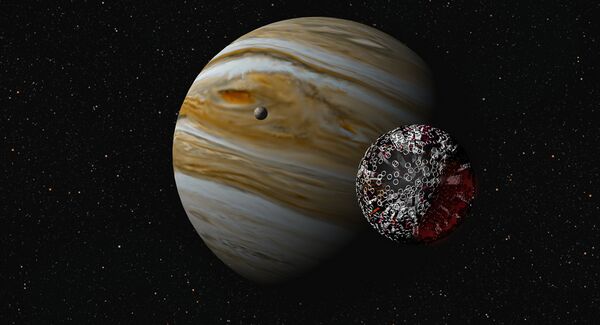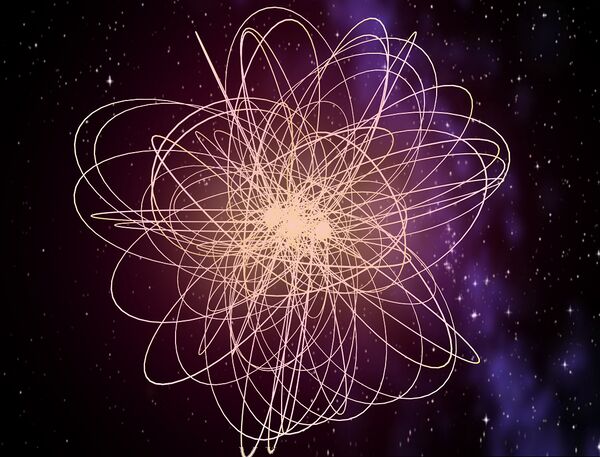Moon Brains (A1-0): Difference between revisions
No edit summary |
No edit summary |
||
| Line 1: | Line 1: | ||
[[File:MoonBrain Ophistodon Star System.jpg|thumb|600x600px|''''' | [[File:MoonBrain Ophistodon Star System.jpg|thumb|600x600px|'''''Galactyan Moon Brain in the Ophistodon Star System. The surface is characterized by exposed circular computational megacircuits. It is theorized that these don't serve any actual purpose, and are just an aesthetic choice by the supported Godling,'''''<br>Image from Steve Bowers on [https://www.orionsarm.com/eg-article/462d990c84198 Orion's Arm].]] | ||
''[[Infrastructures And Megastructures In The Galactyan Empire (A1-0)|<small><u>Go back to the main List</u></small>]]'' | ''[[Infrastructures And Megastructures In The Galactyan Empire (A1-0)|<small><u>Go back to the main List</u></small>]]'' | ||
A ''' | A '''Moon Brain''' is a computational substrate megastructure comparable in mass and size to a small moon or rocky core of a planet, typically in the '''1x10<sup>21</sup> kilogram''' range. | ||
== '''Structure''' == | == '''Structure''' == | ||
The computronium | The computronium structure of a typical Moon Brain usually consists of a highly ordered metastable colloidal structure mostly of '''Diamondoid''' or '''Corundumoid''', as well as other materials. Like in '''[[Jupiter Brains (A1-0)|Jupiter Brains]]''', these colloidal structures form a network of nodes around a central energy core consisting of '''Quantum Dot Circuits''' ('''''QDC''''') and '''Molecular Storage Systems''' ('''''MSS'''''). Each node acts as a processing element, a memory storage system, or both, meant to act with relative independence while still operating in unison with one another. Internal connections between the nodes are often optical, employing fiber optics, waveguides and utilizing directional signals sent through vacuum.[[File:Plasma Processor MoonBrain.jpg|thumb|600x600px|'''''Cooling Loops around a high activity Plasma Processing Moon Brain, radiating vast amounts of waste heat into space.'''''<br>Image from Steve Bowers on [https://www.orionsarm.com/eg-article/462d990c84198 Orion's Arm].]] | ||
If a | If a Moon Brain is constructed using an existing moon or small planet, the resulting object may include portions of the original object in its original form - sometimes a core of lunar rock remains at the center of the Moon Brain, or a crust of apparently inert rock surrounds the processing substrate, or both. Moon Brains which are concealed beneath a layer of native rock are quite common, but they often have issues associated with waste heat management. High activity Moon Brains aren't really able to be concealed by natural material, due to the sheer amount of heat they produce heating up and melting the surface rock, making it glow and giving away it's artificial presence. | ||
Moon Brains that have access to magmatter technology may use '''Plasma Processing''' to increase their processing speed and data density, in which case the energy requirements of the processors would be very high, and the megastructure may glow brightly due to the significant amounts of waste heat emissions. In these cases, numerous '''cooling loops''' are extended from it's surface to increase its surface area and allow heat to be radiated away more efficiently. | |||
== '''Construction''' == | == '''Construction''' == | ||
The construction process of a MoonBrain is extremely similar to the one of a '''[[Jupiter Brains (A1-0)|Jupiter Brain]]''', albeit much, much smaller in scale. | The construction process of a MoonBrain is extremely similar to the one of a '''[[Jupiter Brains (A1-0)|Jupiter Brain]]''', albeit much, much smaller in scale. | ||
'''Self-replicating nanomachines''' are introduced on the selected body, and are provided energy for replication by a | '''Self-replicating nanomachines''' are introduced on the selected body, and are provided energy for replication by a [[Dyson Swarms (A1-0)|'''Dyson Swarm''']] in orbit of the celestial body's primary star. The nanomachines, coupled with specialized '''nanofabricators''' then start to convert, refine and reorganize the moon's matter into the colloidal structures that make up the computronium structure of the Moon Brain. Then, the colloidal structures are connected between one another, first forming the central energy core's QDCs and MSSs, followed by the rest of the nodes network. The cooling loops are then optionally constructed if the structure is supposed to be a high activity Moon Brain | ||
== '''Moon Brains In Sector A1-0''' == | |||
== '''Sources''' == | |||
Orion's Arm: https://www.orionsarm.com/eg-article/462d990c84198 | |||
Interesting Engineering: https://interestingengineering.com/science/how-to-make-a-jupiter-brain-a-computer-the-size-of-a-planet | |||
Revision as of 17:35, 31 December 2023

Image from Steve Bowers on Orion's Arm.
A Moon Brain is a computational substrate megastructure comparable in mass and size to a small moon or rocky core of a planet, typically in the 1x1021 kilogram range.
Structure
The computronium structure of a typical Moon Brain usually consists of a highly ordered metastable colloidal structure mostly of Diamondoid or Corundumoid, as well as other materials. Like in Jupiter Brains, these colloidal structures form a network of nodes around a central energy core consisting of Quantum Dot Circuits (QDC) and Molecular Storage Systems (MSS). Each node acts as a processing element, a memory storage system, or both, meant to act with relative independence while still operating in unison with one another. Internal connections between the nodes are often optical, employing fiber optics, waveguides and utilizing directional signals sent through vacuum.

Image from Steve Bowers on Orion's Arm.
If a Moon Brain is constructed using an existing moon or small planet, the resulting object may include portions of the original object in its original form - sometimes a core of lunar rock remains at the center of the Moon Brain, or a crust of apparently inert rock surrounds the processing substrate, or both. Moon Brains which are concealed beneath a layer of native rock are quite common, but they often have issues associated with waste heat management. High activity Moon Brains aren't really able to be concealed by natural material, due to the sheer amount of heat they produce heating up and melting the surface rock, making it glow and giving away it's artificial presence.
Moon Brains that have access to magmatter technology may use Plasma Processing to increase their processing speed and data density, in which case the energy requirements of the processors would be very high, and the megastructure may glow brightly due to the significant amounts of waste heat emissions. In these cases, numerous cooling loops are extended from it's surface to increase its surface area and allow heat to be radiated away more efficiently.
Construction
The construction process of a MoonBrain is extremely similar to the one of a Jupiter Brain, albeit much, much smaller in scale.
Self-replicating nanomachines are introduced on the selected body, and are provided energy for replication by a Dyson Swarm in orbit of the celestial body's primary star. The nanomachines, coupled with specialized nanofabricators then start to convert, refine and reorganize the moon's matter into the colloidal structures that make up the computronium structure of the Moon Brain. Then, the colloidal structures are connected between one another, first forming the central energy core's QDCs and MSSs, followed by the rest of the nodes network. The cooling loops are then optionally constructed if the structure is supposed to be a high activity Moon Brain
Moon Brains In Sector A1-0
Sources
Orion's Arm: https://www.orionsarm.com/eg-article/462d990c84198
Interesting Engineering: https://interestingengineering.com/science/how-to-make-a-jupiter-brain-a-computer-the-size-of-a-planet